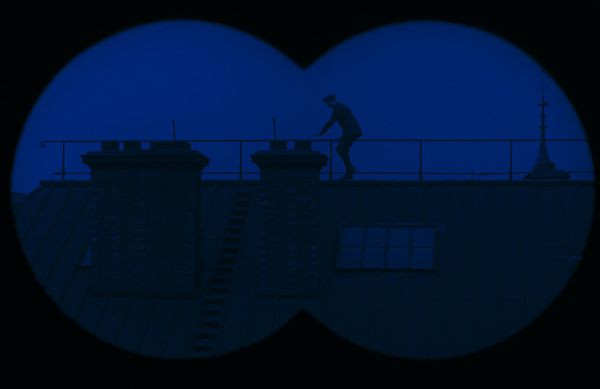Eye For Film >> Movies >> Louis Feuillade: The Complete Crime Serials (2024) Blu-Ray Review
Louis Feuillade: The Complete Crime Serials
Reviewed by: Donald Munro
Read Donald Munro's film review of Louis Feuillade: The Complete Crime Serials
The first four crime serials by Louis Feuillade are gathered together in Louis Feuillade : The Complete Crime Serials (1913-1918) (Limited Edition Set). The nine discs contain the following. Fantômas: the master criminal evades justice with superhuman regularity. Les Vampires: a reporter investigates a shadowy crime syndicate; Judex: an early caped crusader takes revenge against a corrupt banker, but what happens when he isn't ruthless enough to go through with it fully? Tih-Minh: magic, mysticism, a secret document and a treasure that can change the fate of Europe, but how is an innocent young Vietnamese woman, Tih-Minh, mixed up in it all?
The four serials are regarded as being highly influential in the development of cinema, especially action, crime and spy films. When it comes to comics, the supervillain and the masked avenger have their roots here. Within these four we can see Feuillade develop a cinematic language that permeates these genres. They are forward looking, embracing the technological changes that took place in the early part of the 20th Century. In a horse drawn age Louis makes the car king. The wired telephone is used as ubiquitously as the cellphone is now. There are secret labs in Les Vampires, Judex and Tih-Minh. The modern cityscape is used extensively. Starting with the outdoor scenes in Fantômas, the sets follow diagonal lines across the screen. By Judex the dynamism of the diagonal is used throughout. Feuillade's new language is about entertainment. For him it is more important to be stylish than worthy, or even entirely logical.
The four serials have been restored. As the technology used in the restoration of film has improved, so has the quality of the restorations. The two older restorations, of Fantômas and Les Vampires, can be a little scrappy in places though they are perfectly watchable. The latter two, Judex and Tih-Minh, were both done in the last five years and look flawless. The restorers have made the choice to tone down the graininess of the film. Some people may find that this lacks authenticity. The scores for the latter two restorations are a good tonal fit for the films and add to the narrative.
There are some issues when it comes to the subtitling of the films. Some of the language has been either updated or Americanised in a way that is tonally jarring. 'Millionaire' has been changed to 'billionaire', whereas '200,000 dollars' remains unchanged (about 7 million to the billionaire). 'Zut alors!' goes to 'Shucks!' and 'beuglant' is translated as 'Honky Tonk', which is quite inaccurate. Sometimes a translation has to provide context. 'Apache' is translated to 'Apache', but that is meaningless without some knowledge of crime in the Belle Époque. There are occasions where the translation does not fit what is going on on the screen. 'Petite paysanne' often would be 'young farm girl', but not if it refers to a woman who is short and old.
The Blu-rays come with a goodly amount of special features. The audio commentaries place the four series in an artistic and historical context. There a four video essays that go into topics related to the serials. Along with the discs there is a booklet containing six essays that discuss some more in-depth aspects of the films. These are well worth the read.
Apart from some of the subtitling, Louis Feuillade : The Complete Crime Serials (1913-1918) is a well put together package. What you have to remember is not the historical significance of the films but that they are, as Feuillade originally intended, fun to watch.
Reviewed on: 11 Nov 2024















